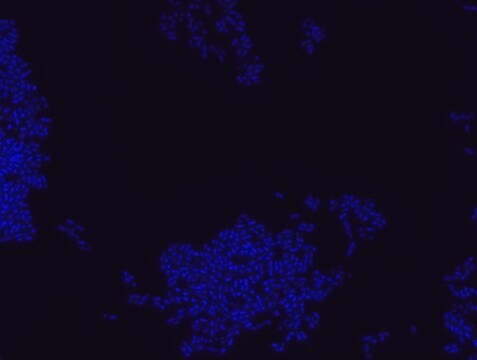추천 제품
생물학적 소스
synthetic
Quality Level
양식
powder
기술
cell culture | mammalian: suitable
불순물
Endotoxin, microbial, and trace metals; tested
pH
4.7-5.3 (, )
유용한 pH 범위
6.8-8.2
pKa(25 °C)
7.5
적합성
suitable for manufacturing use
외래 활성
Cytotoxicity, DNase, NICKase, RNase, and Protease; tested
SMILES string
OCCN1CCN(CC1)CCS(O)(=O)=O
InChI
1S/C8H18N2O4S/c11-7-5-9-1-3-10(4-2-9)6-8-15(12,13)14/h11H,1-8H2,(H,12,13,14)
InChI key
JKMHFZQWWAIEOD-UHFFFAOYSA-N
유사한 제품을 찾으십니까? 방문 제품 비교 안내
일반 설명
Our SAFC® portfolio of high-quality raw materials for use in biopharmaceutical processing withstands strict quality control procedures plus the documentation and expertise to help our customers meet requirements as defined by the M-Clarity Program.
M-Clarity Program
Buffer quality is vital for the success of biopharmaceutical processes, because buffers are indispensable in nearly every production step.
Our broad portfolio of buffer materials manufactured under appropriate controls is tailored to your needs. Ranging from non-GMP grades for low-risk application, to IPEC-PQG GMP for higher-risk applications, we have products covering all your manufacturing needs.
M-Clarity Program
Buffer quality is vital for the success of biopharmaceutical processes, because buffers are indispensable in nearly every production step.
Our broad portfolio of buffer materials manufactured under appropriate controls is tailored to your needs. Ranging from non-GMP grades for low-risk application, to IPEC-PQG GMP for higher-risk applications, we have products covering all your manufacturing needs.
애플리케이션
HEPES is a biological buffer often referred to as a “Good′s” buffer. It is the most commonly used biological buffer since the pKa of HEPES is 7.31 which corresponds to the physiological pH of 7.36. HEPES is considered to be non-toxic to culture cell lines, highly water soluble and provides high solution clarity.
HEPES is used in cell culture media, in biopharma buffer formulations (both upstream and downstream), and in diagnostic reagents. HEPES based buffers are used in purification bioprocesses of antibodies, bioactives, proteins and growth factors.
HEPES is used in cell culture media, in biopharma buffer formulations (both upstream and downstream), and in diagnostic reagents. HEPES based buffers are used in purification bioprocesses of antibodies, bioactives, proteins and growth factors.
법적 정보
SAFC is a registered trademark of Merck KGaA, Darmstadt, Germany
교체됨
제품 번호
설명
가격
Storage Class Code
11 - Combustible Solids
WGK
WGK 1
Flash Point (°F)
Not applicable
Flash Point (°C)
Not applicable
가장 최신 버전 중 하나를 선택하세요:
시험 성적서(COA)
Lot/Batch Number
이미 열람한 고객
Brendan M Leung et al.
Journal of tissue engineering and regenerative medicine, 9(11), 1247-1258 (2013-03-19)
Modular cardiac tissues developed both vascular and cardiac structures in vivo, provided that the host response was attenuated by omitting xenoproteins from the modules. Collagen gel modules (with Matrigel(TM)) containing cardiomyocytes (CMs) alone or CMs with surface-seeded endothelial cells (ECs; CM/EC
P Dey et al.
Oncogene, 33(33), 4213-4225 (2013-10-01)
Estrogen receptor β (ERβ) is emerging as a critical factor in understanding prostate cancer biology. Although reduced in prostate cancer above Gleason grade 3, ERβ is a potential drug target at the initial stage of the disease. In human prostate
Frédéric Perros et al.
Journal of the American College of Cardiology, 65(7), 668-680 (2015-02-14)
Endothelial cell (EC) dysfunction plays a central role in the pathogenesis of pulmonary arterial hypertension (PAH), promoting vasoconstriction, smooth muscle proliferation, and inflammation. This study sought to test the hypothesis that nebivolol, a β1-antagonist and β2,3-agonist, may improve PAH and
Bérangère Pinan-Lucarré et al.
Nature, 511(7510), 466-470 (2014-06-05)
Because most neurons receive thousands of synaptic inputs, the neuronal membrane is a mosaic of specialized microdomains where neurotransmitter receptors cluster in register with the corresponding presynaptic neurotransmitter release sites. In many cases the coordinated differentiation of presynaptic and postsynaptic
Alexandre Albanese et al.
ACS nano, 8(6), 5515-5526 (2014-05-07)
A nanoparticle's physical and chemical properties at the time of cell contact will determine the ensuing cellular response. Aggregation and the formation of a protein corona in the extracellular environment will alter nanoparticle size, shape, and surface properties, giving it
자사의 과학자팀은 생명 과학, 재료 과학, 화학 합성, 크로마토그래피, 분석 및 기타 많은 영역을 포함한 모든 과학 분야에 경험이 있습니다..
고객지원팀으로 연락바랍니다.

![2-[4-(2-Hydroxyethyl)-1-piperazinyl]-ethanesulfonic acid Buffer substance HEPES EMPROVE® EXPERT](/deepweb/assets/sigmaaldrich/product/images/351/602/c50c8b6f-6bcd-4751-9064-2cc5cb47d00f/640/c50c8b6f-6bcd-4751-9064-2cc5cb47d00f.jpg)
